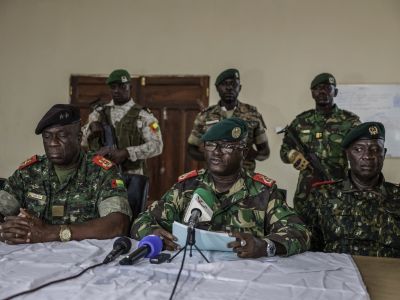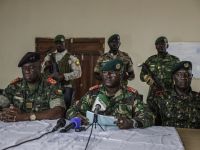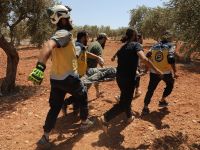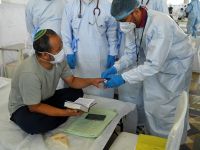Palestinian hospital sources said Thursday afternoon that 10 Palestinians were hurt by a blast between a minibus and a taxi in the West Bank city of Jenin. The sources said the blast may have been caused by a land mine planted by Palestinians as defense against Israeli forces.
Elsewhere, a Palestinian opened fire on an Israeli car near the West Bank city of Hebron, Israel Radio reported. The driver of the car said that the assailant stood in the middle of the road and fired eight rounds in the direction of his car. The driver was not injured and reported the incident to security officials.
Palestinian witnesses said troops arrested four Palestinians in Qalqilya soon after a West Bank ambush that killed a rabbi settler early Thursday. Among those arrested was Ahmed Haza, who is considered the head of Fatah in Qalqilya area. An Israeli bulldozer later demolished the house where he was found.
Fatah’s Al Aqsa Martyrs Brigades and the Popular Army Front-Return Battalions both said they carried out the shooting attack, in statements issued in the West Bank and Beirut respectively.
Meanwhile, a senior Israeli official said Thursday that security talks between Israel and Palestinians are to resume Friday or Saturday on a local level. The comment came only hours after the shooting attack in the West Bank. The talks are to take place in areas in which Israel has decided to ease restrictions: Gaza Strip, Jericho, Bethlehem and Hebron. The Israeli security establishment has not yet confirmed the resupmtion of talks.
For his part, U.S. ambassador to Israel Dan Kurtzer on Thursday called on Israel to further ease restrictions on the Palestinians and to increase their freedom of movement within the Palestinian-controlled areas, saying that efforts must be made "to prevent a humanitarian disaster in the territories."
Kurtzer made these comments during a meeting between the Israeli negotiating team, led by Foreign Minister Shimon Peres, and the members of the international community 'task force' in Israel, who are assisting in promoting the reforms in the Palestinian Authority.
Peres presented the foreign officials with Israel's plan for easing sanctions on the Palestinians, which were decided on this week, including the decision to transfer NIS 200 million of frozen PA tax money. Peres said that Israel was interested in helping the Palestinians, but that confidence in the PA was very "low." Improving the Palestinians' quality of life, he said, was dependent on one thing alone - security.
Minister Dan Naveh told the officials that Israel has a moral obligation to help the Palestinians. "The only reason we entered the Palestinian cities is the lack of security. We will be prepared to leave them, if Israeli lives are not endangered," Naveh was quoted as saying.
In a related development, Israel’s Prime Minister Ariel Sharon has agreed to drop his demand for the setting up of a monitoring body to oversee the allocation of tax revenues Israel has unfrozen and handed over to the Palestinian Authority. Earlier in the week, Sharon had approved the transfer of the funds, which are taxes collected by Israel and passed on to the PA, and which were frozen after the intifada erupted in September 2000, conditional on the creation of an international monitoring body. (Albawaba.com)
© 2002 Al Bawaba (www.albawaba.com)









